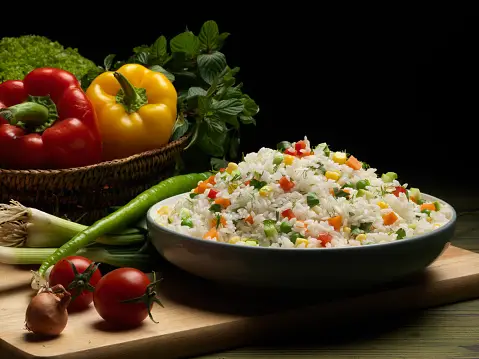Nigerian recipes are great for your baby because they contain nutrient-rich ingredients that are important for the growth and development of infants. Babies can benefit from a well-balanced and nutrient-rich diet, thanks to the rich variety of flavours and textures found in traditional Nigerian cuisine.
The following explains why Nigerian recipes are healthy for your infant:
- Iron-dense foods: Iron-rich foods like leafy green vegetables and lean meats are part of many traditional Nigerian dishes. Red blood cell formation and the prevention of iron-deficiency anaemia in newborns depend on iron.
- Herbs and spices: Nigerian food is renowned for utilising a variety of herbs and spices, which not only enhance flavour but may also have health benefits. Certain spices may have digestive or anti-inflammatory qualities that improve the baby’s health.
- Fresh and homemade ingredients: Fresh, locally sourced ingredients enable better control over the food’s quality and freshness when preparing baby food at home. This method reduces the amount of additives and preservatives frequently present in baby foods prepared commercially.
- Introduction to texture: Nigerian recipes frequently incorporate a range of textures, allowing babies to experiment with different consistencies as they go from purees to more substantial meals. This encourages self-feeding and supports the development of oral motor skills.
- Varying nutrient profile: A wide range of food groups, including proteins, carbs, healthy fats, vitamins, and minerals, are frequently included in Nigerian cuisine. Lean meats, seafood, vegetables, fruits, grains, and other ingredients provide various nutrients essential for a baby’s general health.
- High protein content: Fish, poultry, and legumes are common protein sources in Nigerian cuisine. Protein is essential for your baby to grow their muscles and to develop their tissues.
- Adding nutritious fats: Nuts, seeds, and palm oil are common ingredients in Nigerian recipes. These ingredients provide healthy fats for your baby’s overall growth and brain development.
Here are five creative Nigerian rice recipes that are suited for infants, incorporating a variety of flavours and textures while also taking into account their nutritional needs:
Mashed rice with sweet potatoes
Ingredients: water, sweet potato, and rice.
How to prepare:
- You'll need to prepare the rice by cooking it separately.
- Boil your sweet potatoes or steam them until tender, then mash or puree them into a smooth consistency.
- After your rice is soft, combine the sweet potato puree and mash or blend until the desired consistency is reached.
- Ensure you cook them thoroughly to be suitable for your baby to eat.
Rice congee with chicken
Ingredients: Rice, skinless, boneless chicken, and water are the ingredients.
How to prepare:
- Prepare your rice separately from your chicken.
- Before shredding or finely chopping your chicken, boil or steam it until it is done.
- Blend or mash the cooked rice until you achieve the necessary consistency. You can combine it with shredded chicken.
Coconut and mango rice pudding
Ingredients: water, coconut milk, rice, and ripe mango.
How to prepare:
- Cook rice in water and coconut milk until it becomes tender.
- Puree ripe mangos until they're smooth.
- Combine the cooked coconut rice and mango puree to make a sweet and creamy pudding.
Avocado and spinach rice
Ingredients: water, spinach, avocado, and rice.
How to prepare:
- Prepare your rice by cooking it separately.
- Puree your cooked spinach with ripe avocado until smooth.
- To make a creamy, nutrient-rich combination, combine the cooked rice with the pureed avocado and spinach.
Mashed rice with carrots and turmeric
Ingredients: water, rice, turmeric, and carrots.
How to prepare:
- Prepare the rice by cooking it separately.
- Boil or steam your carrots until they're tender. Then, puree or mash them.
- Add a pinch of turmeric for colour and extra nutrients when mixing the cooked rice and carrot puree.
These creative and delicious recipes offer a delightful tummy experience for your little one. You can get creative with other ingredients, but ensure they meet your infant’s nutritional requirements.
Frequently Asked Questions (FAQs)
- Can my eight-month-old baby eat rice?
At eight months, you can introduce rice to your baby’s diet, but it is essential to ensure it is well-cooked and in a form suitable for their age.
- Can I feed my baby fried rice?
Fried rice may be challenging for your baby to handle due to its texture and added ingredients. However, you can offer plain cooked rice and gradually introduce more dishes.
- Will my baby lose weight if I feed them rice often?
Your baby cannot lose weight if you feed them rice often. However, add proteins and vegetables to ensure they have a balanced diet.










Comments